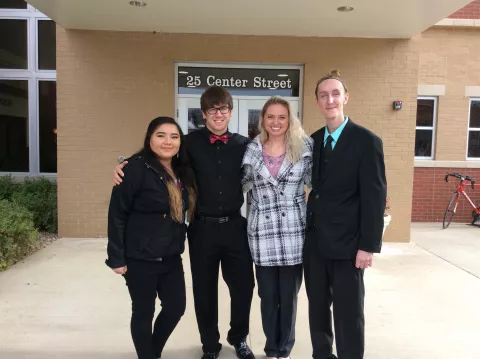USD Professor Julia Hellwege is engaging students in her Introduction to American Government course to be engaged in civics. Each is required to become involved with local non-profits to perform a community service and present their activities to their peers. Several members of her class volunteered to work with the Sierra Club this semester.
Mark Winegar, an alumni and Chair of the Sierra Club’s South Dakota Chapter says, “I am impressed with each of these outstanding students. They wanted to fight climate change and dived right into it.” The students working with the Sierra Club include Amber Rae Hulse, Tyler Wenande, Dalton Houska, and Carol (Mia) Exendine.
Hulse says, “Our group started as the result of a required school project. Our original goals are now expanding into something we all believe will have a lasting impact on our community, further raising awareness of the benefits of solar power and using LED lights from an economic standpoint as well as an environmental one.”
The team plans to encourage the City of Vermillion and University of South Dakota to transition outdoor lighting to energy efficient light bulbs powered by solar panels. They are working with Mike Carlson, Vermillion’s Financial Officer, to compile comparative statistics and analyze potential benefits. The hope to present their findings at an upcoming City Council meeting.
The team arranged with Jason Thiel, manager of Coyote Twin Theaters in Vermillion and Erin Griffin, National Geographic Channels VP of Global Communications to present the award winning documentary From The Ashes to students enrolled in Political Science, Earth Science, and Sustainability courses the evening of November 13th, 2017.
Director Michael Bonfiglio says, “From the Ashes is one of the most complex projects I’ve ever been involved in, and it was a real team effort to bring it to life. From the very beginning, in the spring of 2016 when we started pre- production, we wanted to make something that put a human face on the complicated issues tied to coal production, such as the future of the energy sector, the risks to people’s health and livelihood, and the environment. These are challenges that should not be reduced to one-note sound bites as they often are in today’s hyper-political climate.”
Winegar says, “Working with these students is an inspiration”.

